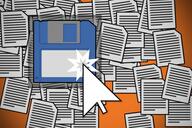You have /5 articles left.
Sign up for a free account or log in.
In my two years working in the president's office at Harvard University, before I was laid off in spring, I gave myself the job of steward of her books. Gift books would arrive in the mail, or from campus visitors, or from her hosts when she traveled; books by Harvard professors were kept on display in reception or in storage at our Massachusetts Hall office; books flowed in from publishers, or authors seeking blurbs, or self-published authors of no reputation or achievement, who sometimes sent no more than loosely bound manuscripts.
I took charge of the president’s books because it was my assigned job to write thank-you letters for them. I would send her the books and the unsigned draft replies on presidential letterhead; for each one, she sent me back the signed letter and, most of the time, the book, meaning she had no further use for it. Some books she would keep, but seldom for very long, which meant those came back to me too, in one of the smaller offices on the third floor of Mass Hall where there was no room to put them. Furthermore they weren’t so easily disposed of. Often they bore inscriptions, to President Drew Faust or to her and her husband from people they knew; and even if the volume was something rather less exalted — a professor from India sending his management tome or a book of Hindi poems addressed, mysteriously, to "Sir" or to the "vice-chancellor of Harvard University" — these books obviously couldn’t end up in a secondhand bookshop or charity bin or anywhere they could cause embarrassment. All were soon moved to an overflow space at the very end of the hall, coincidentally looking out at a donation bin for books at a church across the street.
One might feel depressed sitting amid so many unwanted books — so much unread knowledge and overlooked experience — but tending President Faust's books became my favorite part of the job. No one noticed or interfered in what I did, which in a president's office like Harvard, where everything is scrutinized, is uncommon. Even a thank-you note can say too much. I developed my own phrase for these notes — "I look forward to spending some time with it" — as a substitute for saying "I look forward to reading it," because the president can't possibly read all the books she receives, and there was always the chance she would run into the author somewhere, who might ask if she'd read his book yet.
Any Harvard president attracts books from supplicants, and this particular president attracted her own subcategory. Many books came from publishers or authors not at all shy about requesting a presidential blurb. These were easy to decline, and became easy to decline even when they came from the president's friends, colleagues, acquaintances, neighbors, and others met over a distinguished career as a Civil War historian. This was the subcategory: thanks to her specialty, we were building up a large collection of Civil War books, galleys and unpublished manuscripts — not just professional monographs, but amateurish family or local histories. These soon filled the overflow space in Massachusetts Hall, where water leaking from the roof during the unusual March rainstorms resulted in our having to discard several.
For everyone who sent us a book, the signed note back from the president mattered more than the book itself; both sides presumably understood that the president could buy or obtain any book she actually needed. The replies were signed by her — no auto-pen — which meant that even if she didn't quite read your book the president still held it in her hands even for a moment, perhaps scribbling something at the bottom of her note with a fine black pen, or crossing out the "Ms." or "Professor" heading and substituting the author's first name.
I had all kinds of plans for these books. The inscribed books we had to keep, of course, no matter how dire or dreadful. (The archives would want its pick of them anyway, deciding which books would become keepsakes of this particular era at Harvard.) But the many good titles that remained could go to struggling small foreign universities or schools, to our soldiers and Marines overseas, or to local libraries as an act of goodwill from a powerful and oft-maligned neighbor. They could go to the Allston branch of the Boston Public Library, for instance, perhaps to be dubbed “the president's collection,” with its own shelving but freely available to Allstonians to read or borrow.
None of these ideas came to fruition. All of them would have required me to rise to a realm where I was no longer in charge — indeed, where I didn’t have a foothold. I would have to call meetings, bring bigger players to the table. Harvard’s top bureaucracy is actually quite small, and most of it was, literally, in my immediate presence: two doors to the left was one vice president, two doors to the right, around a tight corner, was another. But these were big-gesture folks alongside a resolutely small-gesture one (me), and without an intermediary to help build support for my ideas my books weren’t going anywhere except, once, into a cardboard box outside my office just before Christmas, where I encouraged staff to help themselves; perhaps two dozen books, or half what I started the box with, went out that way.
In all this, the important thing was that books were objects to be honored, not treated as tiresome throwaways, and that everyone in the building knew this. Books are how, traditionally, universities are built: John Harvard was not the founder of Harvard University but a clergyman who, two years after its founding, bequeathed it his library. I used to joke that the most boring book in our collection was the volume called the "Prince Takamado Trophy All Japan Inter-Middle School English Oratorical Contest," but if I hear it isn’t still on a shelf somewhere in Mass Hall 20 years from now, I won’t be the only one who’s disappointed.




